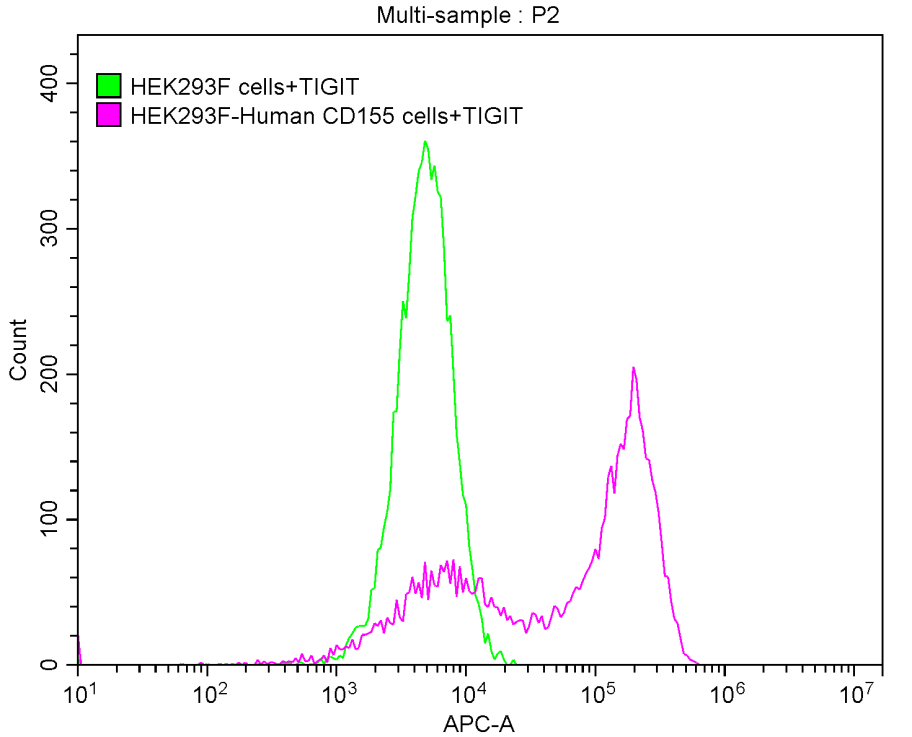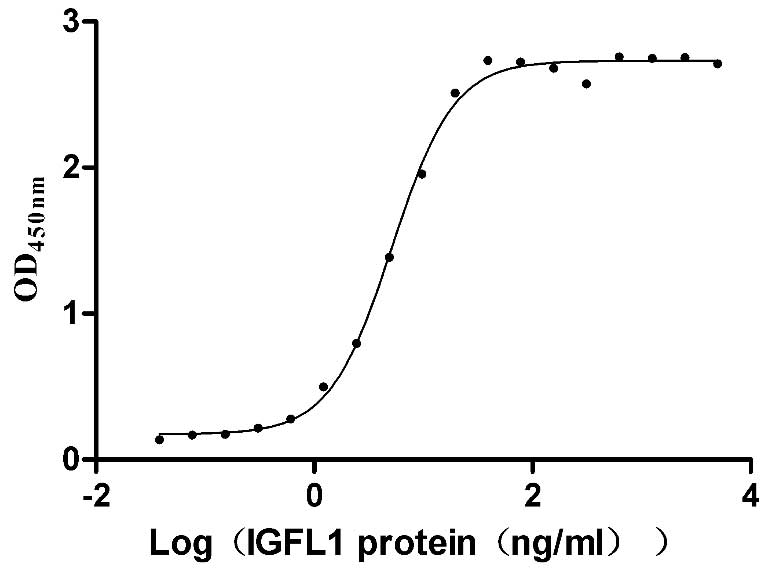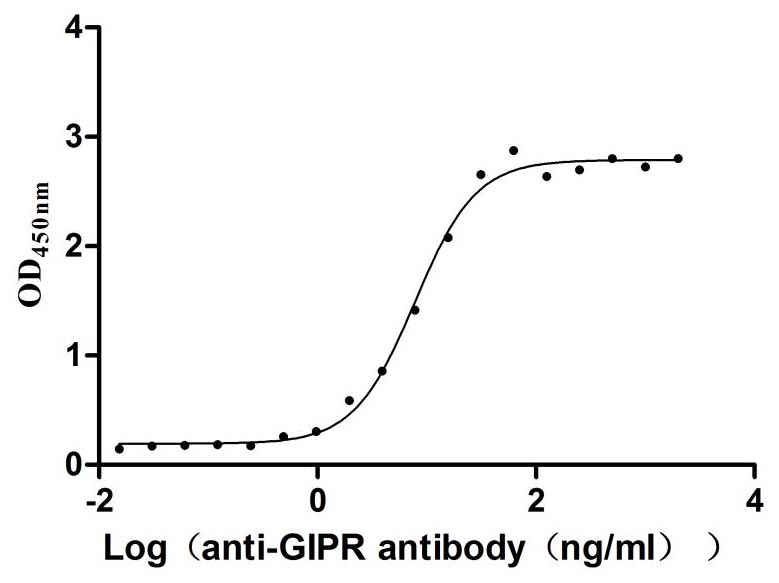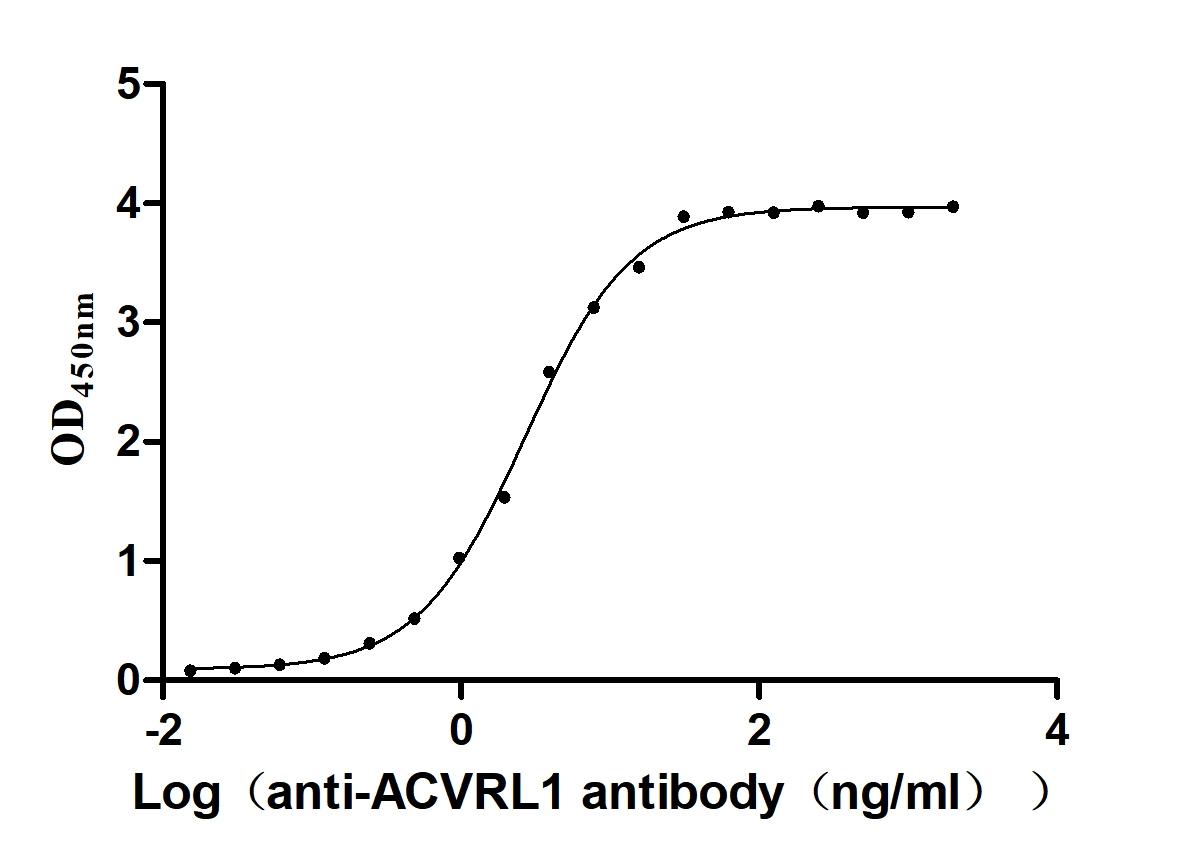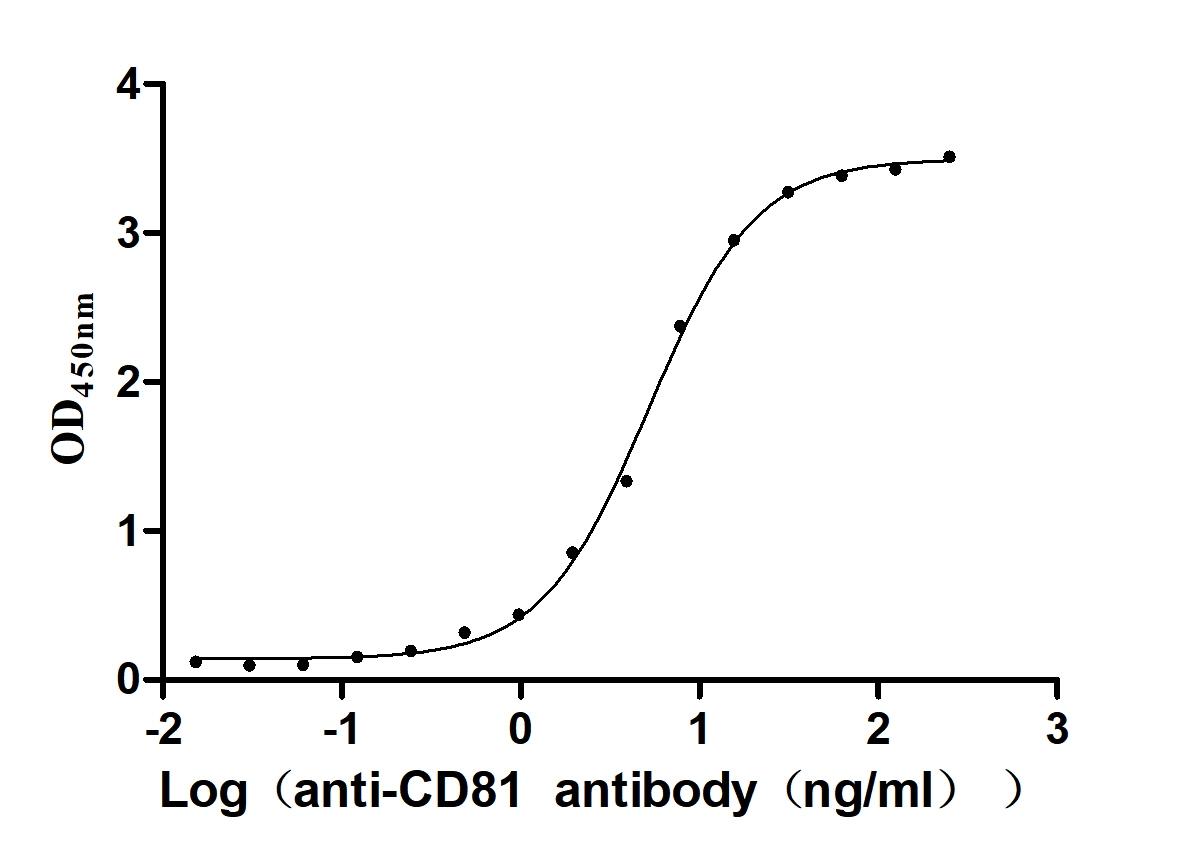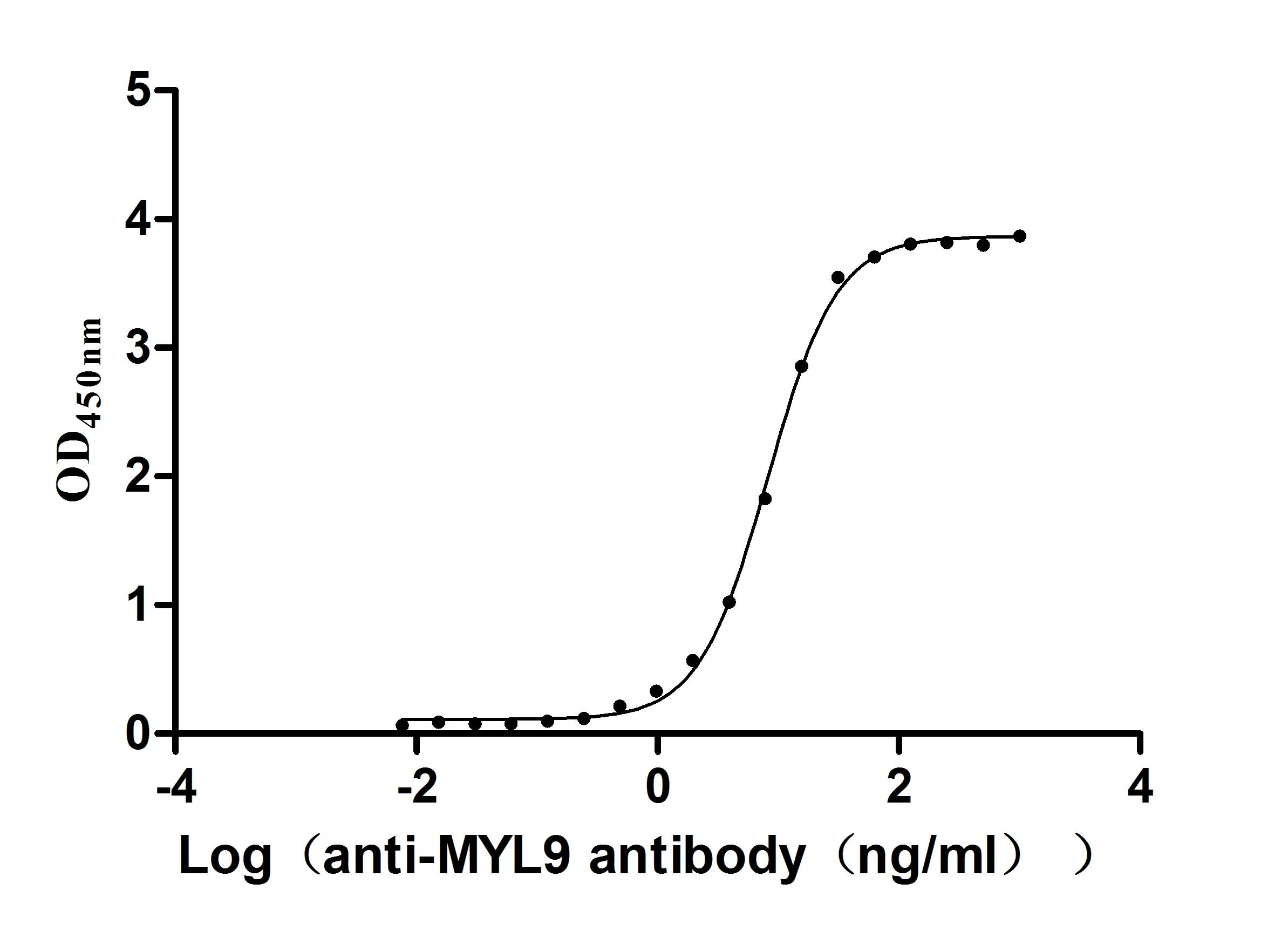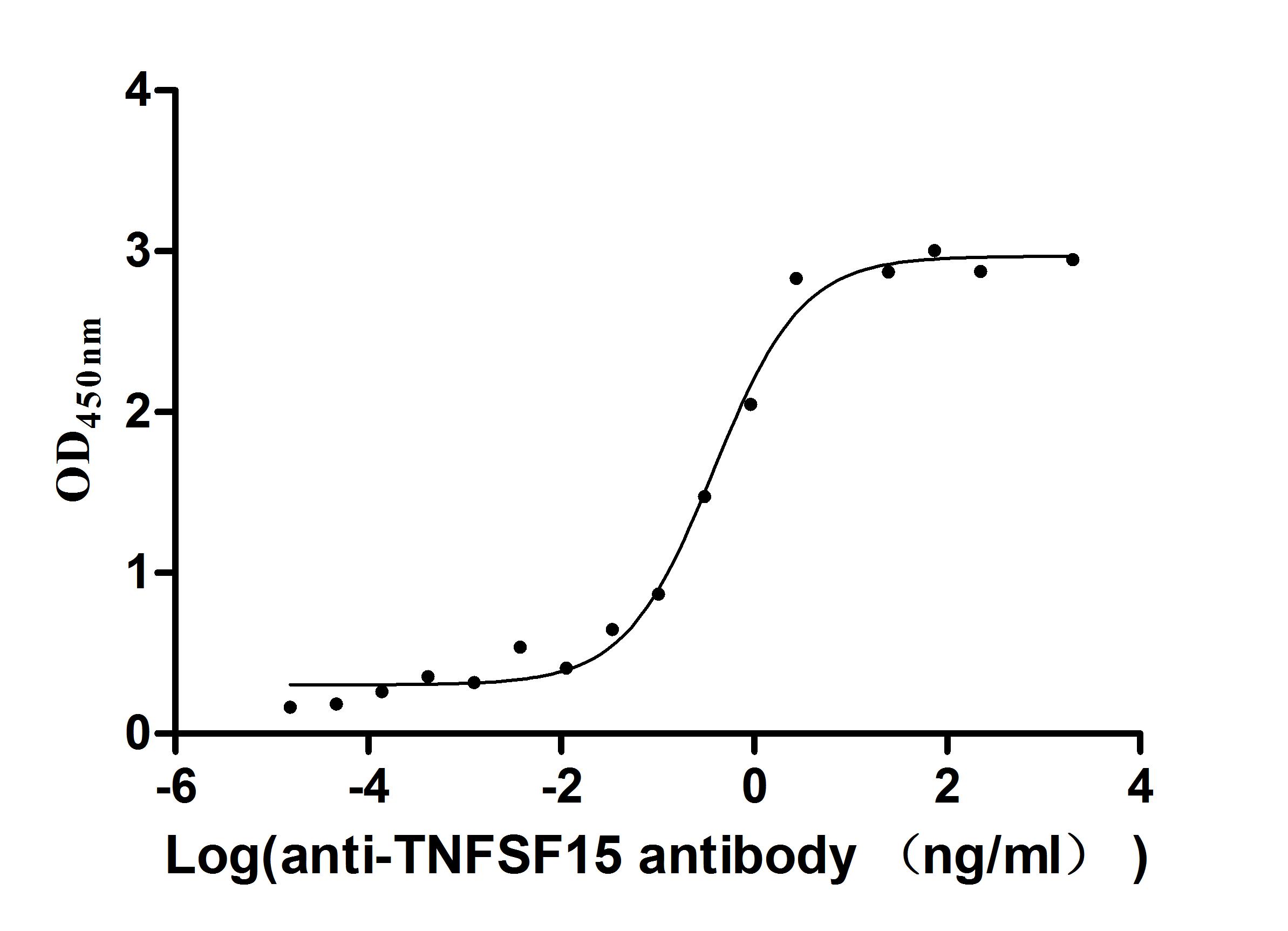Recombinant Human Signaling lymphocytic activation molecule (SLAMF1), partial
-
货号:CSB-YP614403HU
-
规格:
-
来源:Yeast
-
其他:
-
货号:CSB-EP614403HU
-
规格:
-
来源:E.coli
-
其他:
-
货号:CSB-EP614403HU-B
-
规格:
-
来源:E.coli
-
共轭:Avi-tag Biotinylated
E. coli biotin ligase (BirA) is highly specific in covalently attaching biotin to the 15 amino acid AviTag peptide. This recombinant protein was biotinylated in vivo by AviTag-BirA technology, which method is BriA catalyzes amide linkage between the biotin and the specific lysine of the AviTag.
-
其他:
-
货号:CSB-BP614403HU
-
规格:
-
来源:Baculovirus
-
其他:
-
货号:CSB-MP614403HU
-
规格:
-
来源:Mammalian cell
-
其他:
产品详情
-
纯度:>85% (SDS-PAGE)
-
基因名:
-
Uniprot No.:
-
别名:4933415F16; AA177906; CD 150; CD150; CD150 antigen; CDw150; Estm51; Ipo 3; IPO-3; Ipo3; MGC151472; MGC151476; OTTHUMP00000025670 ; OTTHUMP00000060252; RGD1560634; Signaling lymphocytic activation molecule; Signaling lymphocytic activation molecule family member 1; Signaling lymphocytic activation molecule family member 1; isoform CRA_a ; Signaling lymphocytic activation molecule family member 1; isoform CRA_b ; Signaling lymphocytic activation molecule precursor ; Slaf1 ; SLAF1_HUMAN; SLAM family; member 1; Slamf 1; SLAMF1; SLAMF1 protein
-
种属:Homo sapiens (Human)
-
蛋白长度:Partial
-
蛋白标签:Tag type will be determined during the manufacturing process.
The tag type will be determined during production process. If you have specified tag type, please tell us and we will develop the specified tag preferentially. -
产品提供形式:Lyophilized powder
Note: We will preferentially ship the format that we have in stock, however, if you have any special requirement for the format, please remark your requirement when placing the order, we will prepare according to your demand. -
复溶:We recommend that this vial be briefly centrifuged prior to opening to bring the contents to the bottom. Please reconstitute protein in deionized sterile water to a concentration of 0.1-1.0 mg/mL.We recommend to add 5-50% of glycerol (final concentration) and aliquot for long-term storage at -20℃/-80℃. Our default final concentration of glycerol is 50%. Customers could use it as reference.
-
储存条件:Store at -20°C/-80°C upon receipt, aliquoting is necessary for mutiple use. Avoid repeated freeze-thaw cycles.
-
保质期:The shelf life is related to many factors, storage state, buffer ingredients, storage temperature and the stability of the protein itself.
Generally, the shelf life of liquid form is 6 months at -20°C/-80°C. The shelf life of lyophilized form is 12 months at -20°C/-80°C. -
货期:Delivery time may differ from different purchasing way or location, please kindly consult your local distributors for specific delivery time.Note: All of our proteins are default shipped with normal blue ice packs, if you request to ship with dry ice, please communicate with us in advance and extra fees will be charged.
-
注意事项:Repeated freezing and thawing is not recommended. Store working aliquots at 4°C for up to one week.
-
Datasheet :Please contact us to get it.
相关产品
靶点详情
-
功能:Self-ligand receptor of the signaling lymphocytic activation molecule (SLAM) family. SLAM receptors triggered by homo- or heterotypic cell-cell interactions are modulating the activation and differentiation of a wide variety of immune cells and thus are involved in the regulation and interconnection of both innate and adaptive immune response. Activities are controlled by presence or absence of small cytoplasmic adapter proteins, SH2D1A/SAP and/or SH2D1B/EAT-2. SLAMF1-induced signal-transduction events in T-lymphocytes are different from those in B-cells. Two modes of SLAMF1 signaling seem to exist: one depending on SH2D1A (and perhaps SH2D1B) and another in which protein-tyrosine phosphatase 2C (PTPN11)-dependent signal transduction operates. Initially it has been proposed that association with SH2D1A prevents binding to inhibitory effectors including INPP5D/SHIP1 and PTPN11/SHP-2. However, signaling is also regulated by SH2D1A which can simultaneously interact with and recruit FYN which subsequently phosphorylates and activates SLAMF1. Mediates IL-2-independent proliferation of activated T-cells during immune responses and induces IFN-gamma production. Downstreaming signaling involves INPP5D, DOK1 and DOK2 leading to inhibited IFN-gamma production in T-cells, and PRKCQ, BCL10 and NFKB1 leading to increased T-cell activation and Th2 cytokine production. Promotes T-cell receptor-induced IL-4 secretion by CD4(+) cells. Inhibits antigen receptor-mediated production of IFN-gamma, but not IL-2, in CD4(-)/CD8(-) T-cells. Required for IL-4 production by germinal centers T follicular helper (T(Fh))cells. May inhibit CD40-induced signal transduction in monocyte-derived dendritic cells. May play a role in allergic responses and may regulate allergen-induced Th2 cytokine and Th1 cytokine secretion. In conjunction with SLAMF6 controls the transition between positive selection and the subsequent expansion and differentiation of the thymocytic natural killer T (NKT) cell lineage. Involved in the peripheral differentiation of indifferent natural killer T (iNKT) cells toward a regulatory NKT2 type. In macrophages involved in down-regulation of IL-12, TNF-alpha and nitric oxide in response to lipopolysaccharide (LPS). In B-cells activates the ERK signaling pathway independently of SH2D1A but implicating both, SYK and INPP5D, and activates Akt signaling dependent on SYK and SH2D1A. In B-cells also activates p38 MAPK and JNK1 and JNK2. In conjunction with CD84/SLAMF5 and SLAMF6 may be a negative regulator of the humoral immune response. Involved in innate immune response against Gram-negative bacteria in macrophages; probably recognizes OmpC and/or OmpF on the bacterial surface, regulates phagosome maturation and recruitment of the PI3K complex II (PI3KC3-C2) leading to accumulation of PdtIns(3)P and NOX2 activity in the phagosomes.; (Microbial infection) Acts as a receptor for Measles virus; also including isoform 4.
-
基因功能参考文献:
- CD150 and CD180 receptors may modulate transcriptional program in lymphocytic leukemia cells by regulating the transcription factor expression levels PMID: 29284783
- this paper shows that the X-linked lymphoproliferative disease gene product SAP regulates signals induced through the co-receptor SLAM PMID: 28827385
- combination of signals via CD150 and CD180 leads to blocking of pro-survival pathways that may be a restraining factor for neoplastic CLL B cells propagation in more than 50% of CLL cases where these receptors are coexpressed PMID: 28982149
- EBF1 is critical for transcriptional control of SLAMF1 gene in human B cells. PMID: 27424222
- MeV can hijack SLAMF1 to drive endocytosis using a complex pathway that shares features with canonical viral macropinocytosis, phagocytosis, and mechanotransduction. This uptake pathway is specific to SLAMF1-positive cells and occurs within 60 min of viral attachment. PMID: 28100610
- Malignant B-cell lines at the different stages of maturation only partially resemble their normal counterparts by CD150 expression. In malignant B-cell lines, CD150 expression on mRNA level is much broader than on protein level. CD150 isoforms are differentially expressed in normal and malignant B cells with predominant expression of mCD150 isoform. PMID: 27356578
- Data suggest that SLAMF1 is another significant piece in the intricate defective immune-regulatory function of patients with SLE. PMID: 25920347
- results indicate that loss of SLAMF1 expression in chronic lymphocytic leukemia modulates genetic pathways PMID: 26619119
- Upstream open reading frames regulate translation of the long isoform of SLAMF1 mRNA that encodes costimulatory receptor CD150 PMID: 25716736
- Molecular dynamics analysis revealed that mutant R32Q and T53I structures of SAP exhibited structural variation with respect to their backbone atoms before and after binding with the unphosphorylated SLAM peptide. PMID: 24770789
- Signaling lymphocytic activation molecule (SLAM)/SLAM-associated protein pathway regulates human B-cell tolerance. PMID: 24373350
- Latent membrane protein 1 was responsible for the CD150 upregulation. PMID: 24238277
- Experimental adaptation of wild-type canine distemper virus (CDV) to the human entry receptor CD150 PMID: 23554862
- conclude that Slamf1 recruits a subset of Vps34-associated proteins, which is involved in membrane fusion and NOX2 regulation PMID: 22493499
- HIV-1 infection induces a high level of SLAM expression on CD4(+) T cells, which may enhance their susceptibility to measles virus and exacerbate measles in coinfected individuals. PMID: 22532682
- the study demonstrates that variants of SLAMF1 and ITLN1, both implicated in inflammation, are associated with type 2 diabetes in Indians. PMID: 22277902
- Subjects previously immunized with measles-mumps-rubella vaccine were genotyped for 66 candidate single nucleotide polymorphisms in the CD46, SLAM and CD209 genes. PMID: 22086389
- The simultaneous interaction of Measles virus glycoprotein-pseudotyped Lentivirus with both CD46 and SLAM is required to achieve efficient and stable transduction of B and T cells. PMID: 21450813
- CD150 receptor could trigger PI3K-mediated Akt signaling pathway in normal, EBV-transformed and malignant B cells. PMID: 21423089
- A role for SLAM in controlling natural killer T (NKT) cell development is consistent with a role in both positive and negative thymic selection of NKT cells in NOD mice. PMID: 21357537
- Our findings suggest that -262A-188G haplotype in the SLAM gene promoter contributes to the risk of systemic lupus erythematosus by increasing the expression of SLAM. PMID: 20810499
- CD150 may contribute to regulation of tumor cell maintenance in low-rate proliferating Hodgkin's lymphoma PMID: 20231852
- Apoptosis of measles virus-infected peripheral blood mononuclear cells is triggered by interaction between viral hemagglutinin protein and cellular receptor, SLAM. PMID: 20618687
- Data show that measles virus infection of alveolar macrophages and subepithelial dendritic cells in the airways precedes infection of lymphocytes in lymphatic organs of mice expressing human SLAM with human-like tissue specificity. PMID: 20042501
- Susceptibility of human dendritic cells (DCs) to measles virus (MV) depends on their activation stages in conjunction with the level of CDw150: role of Toll stimulators in DC maturation and MV amplification PMID: 12270725
- effect of X-linked lymphoproliferative syndrome gene product SAP/SH2D1A on signaling through signaling lymphocyte activation molecule family of immune receptors PMID: 12458214
- direct correlation between the amount of hSLAM expressed on the cells' surface and the degree of measles virus infection; MV infection induced downregulation of receptor hSLAM and inhibited cell division and proliferation of hSLAM(+)T cells PMID: 12610126
- SLAM mRNA expression in PBMC is modulated during the course of specific immunotherapy, and an early and transient increase of SLAM mRNA expression is associated with clinical symptom improvement PMID: 14657878
- SLAM expression correlates directly with T cell responsiveness to Mycobacterium tuberculosis antigen. PMID: 14707094
- murine Measles virus-infected dendritic cells expressing hSLAM receptor downregulated B7-1, B7-2, CD40, MHC class I, and MHC class II expresssion on their surfaces, increased their rate of apoptosis, and inhibited T-cell proliferation. PMID: 15193925
- binding site with measles virus hemagglutinin: attachment sites for MV receptors SLAM and CD46 overlap on the globular head PMID: 15308701
- CD150 and SH2D1A are coexpressed during a narrow window of B-cell maturation and SH2D1A may be involved in regulation of B-cell differentiation via switching of CD150-mediated signaling pathways. PMID: 15315965
- During ligation of SLAM in leprosy, signaling molecules and transcription factors participate in the induction or reinforcement of interferon-gamma production, promoting cell-mediated immune responses to mycobacterial infection. PMID: 15356162
- activation of peripheral blood cells with agonistic anti-CD3 antibody and exogenous IL-2, as used for generation of cytokine-induced killer cells, results in significant SLAM and SAP activation 5 days after TCR stimulation PMID: 15661039
- We have identified several novel SLAM binding sites at residues 429, 436 and 437 of measles virus haemagglutin (MVH) protein and MVH mutants in these residues dramatically decrease the ability to interaction with the cell surface SLAM. PMID: 16889684
- SNPs present in both the SLAM and CD46 genes are associated with measurable and significant variations in antibody response after measles vaccination PMID: 17560639
- Enhancement of anti-tumor activity in vitro and in vivo by CD150 and SAP PMID: 17692919
- SLAM and CD46 do not have a role in measles virus growth and syncytium formation in tumor cell lines PMID: 17715217
- Measles virus can infect and produce syncytia in human polarized epithelial cell lines independently of SLAM and CD46 by using distinctive receptor-binding sites on its hemagglutinin. PMID: 18287234
- The functional roles of interleukin-17, SLAM and CREB on IFN-gamma production in persons with tuberculosis are reported. PMID: 19199539
- SLAM contributes to the enhanced immunostimulatory functions of dendritic cells that are observed following the addition of IL-1 in vitro. PMID: 11489980
显示更多
收起更多
-
亚细胞定位:Cell membrane; Single-pass type I membrane protein.; [Isoform 3]: Secreted.; [Isoform 4]: Cell membrane.
-
组织特异性:Constitutively expressed on peripheral blood memory T-cells, T-cell clones, immature thymocytes and a proportion of B-cells, and is rapidly induced on naive T-cells after activation. Activated B-cells express isoform 1, isoform 3 and a cytoplasmic isoform
-
数据库链接:
HGNC: 10903
OMIM: 603492
KEGG: hsa:6504
STRING: 9606.ENSP00000306190
UniGene: Hs.523660
Most popular with customers
-
Recombinant Human T-cell immunoreceptor with Ig and ITIM domains (TIGIT), partial (Active)
Express system: Mammalian cell
Species: Homo sapiens (Human)
-
Recombinant Human IGF-like family receptor 1 (IGFLR1), partial (Active)
Express system: Mammalian cell
Species: Homo sapiens (Human)
-
Recombinant Rat Gastric inhibitory polypeptide receptor (Gipr), partial (Active)
Express system: Mammalian cell
Species: Rattus norvegicus (Rat)
-
Recombinant Human Serine/threonine-protein kinase receptor R3 (ACVRL1), partial (Active)
Express system: Baculovirus
Species: Homo sapiens (Human)
-
Recombinant Human CD81 antigen (CD81), partial (Active)
Express system: Mammalian cell
Species: Homo sapiens (Human)
-
Recombinant Human Myosin regulatory light chain 12B(MYL12B) (Active)
Express system: E.coli
Species: Homo sapiens (Human)
-
Express system: Mammalian cell
Species: Homo sapiens (Human)


